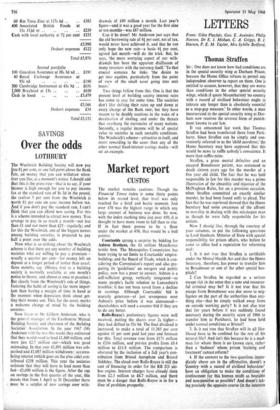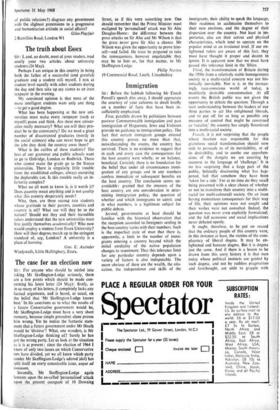Thomas Straffen
LETTERS
From: Giles Playfair, Geo. E. Assinder, Philip Norton, Dr E. J. Mishan, C. A Griggs, B. J. Hurren, P. E. M. Taylor, Mrs Sybille Bedford.
Sir: One does not know how bad conditions are in the special security wing at Durham Prison, because the Home Office refuses to permit any independent observer to report on them. One is entitled to assume, however, that they are worse than conditions in the other special security wings, which (I quote Mountbatten) 'no country with a record of civilised behaviour ought to tolerate any longer than is absolutely essential as a stop-gap measure.' In other words, a man incarcerated in the special security wing at Dur- ham now receives the severest form of punish- ment known to our law.
It was announced last week that Thomas Straffen had been transferred there from Park- hurst. Since Straffen can be simply and con- veniently referred to as the 'child murderer,' the Home Secretary may have supposed that this would be news to ruffle nobody's conscience. It more than ruffles mine.
Straffen, a gross mental defective and an escaped Broadmoor patient, was sentenced to death sixteen years ago for the murder of a five year old child. The fact that he was held responsible in law for this murder was a prime illustration of the absurdity and injustice of the McNaghten Rules, for on a previous occasion, when Straffen committed an exactly similar murder, he had been found unfit to plead. The fact that he was reprieved showed that the Home Secretary had some awareness of the affront to morality in dealing with this misshapen man as though he were fully responsible for his actions.
Now I should like, through the courtesy of your columns, to put the following questions to Lord Stonham, Minister of State with special responsibility for prison affairs, who before he came to office had a reputation for reforming zeal :
1. Is it not true- that Straffen is certifiable under the Mental Health Act and that the Home Secretary, therefore, has power to transfer him to Broadmoor or one of the other special hos- pitals?
2. Can Straffen be regarded as a serious escape risk in the sense that a sane and resource- ful criminal may be? Is it not true that his escape from Broadmoor was due more to neg- ligence on_the part of the authorities than any- thing else—that he simply walked away from an outside working party? Is it not also true that for years before it was suddenly found necessary during the security scare of 1966 to transfer him to Parkhurst, he had been held under normal conditions at Bristol?
3. Is it not true that Straffen will in all like- lihood have to be confined for the rest of his natural life? And isn't this because he is a mad- man for whom there is no known cure, rather than a 'badman' whom prison 'training and treatment' cannot reform?
4. If the answers to the two questions imme- diately above are in the affirmative, doesn't a country with a record of civilised behaviour' have an obligation to make the conditions of Confinement for this human misfit as bearable and non-punitive as possible? And doesn't tak- ing precisely the opposite course (in the interests of public relations?) disgrace any government with the slightest pretensions to a progressive and humanitarian attitude in social affairs?
2 Ramillies Road, London W1 Giles Play!air







































 Previous page
Previous page